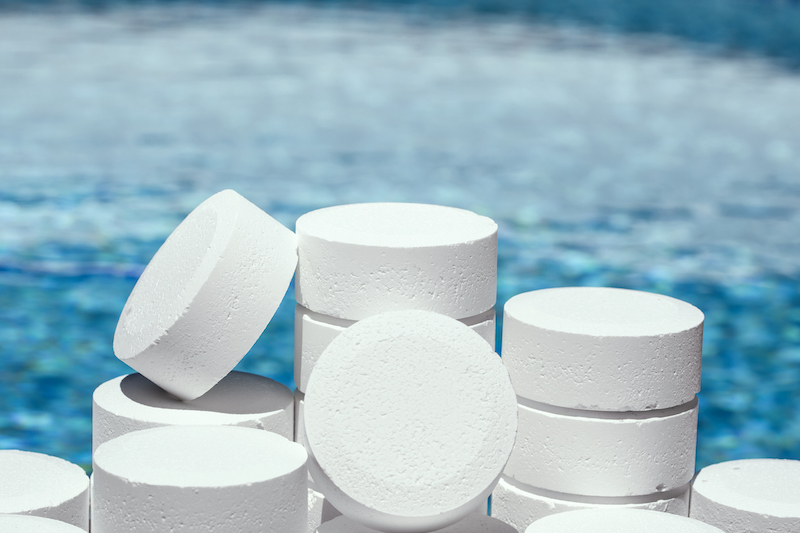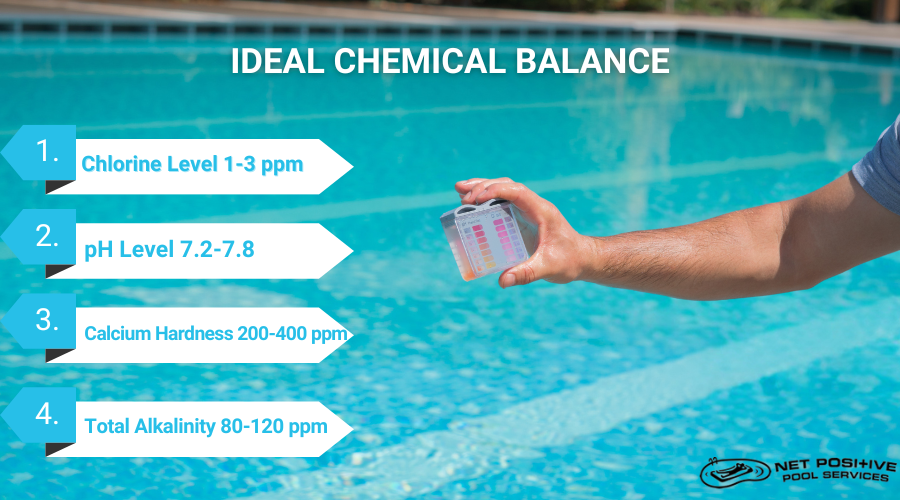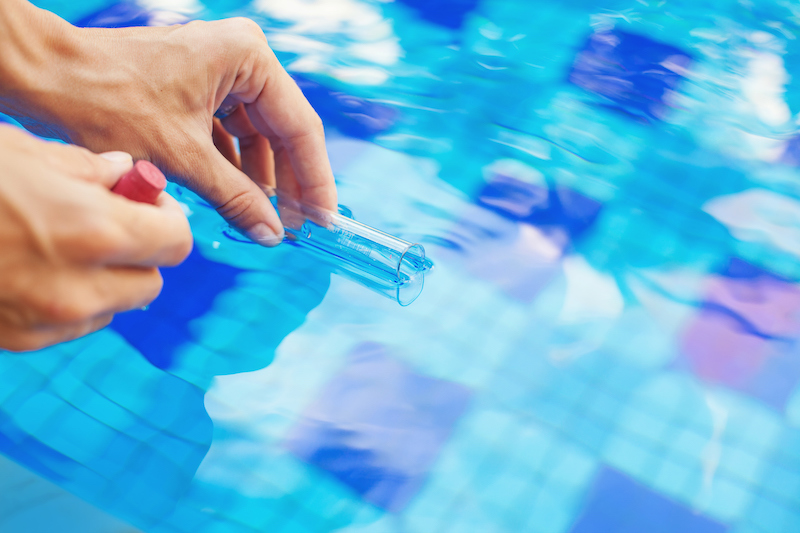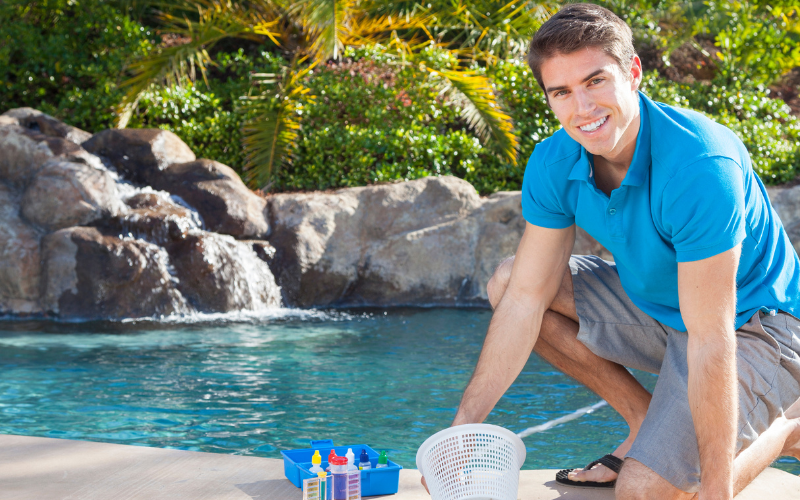Jump To
Achieving and maintaining that crystal-clear water can feel complicated, involving a multitude of pool chemicals. This comprehensive guide aims to clarify what chemicals you need for a swimming pool and why. These include:
- Chlorine
- Muriatic acid
- Sodium bicarbonate
- And many others
Each essential chemical has a specific job, from controlling harmful bacteria and algae to ensuring the water is comfortable on the skin and eyes of the swimmers. Proper maintenance can protect the pool equipment, improve the longevity of your pool, and enhance the overall swimming experience.
Ready to dive in? Keep reading to discover the essential pool chemicals and their importance in maintaining your swimming pool.

Necessary Pool Chemicals and their Functions
When it comes to pool maintenance, it’s essential to know your chemicals. Each type serves a specific purpose to regulate pool water parameters. Understanding these details will help you maintain your pool’s clarity, safety, and longevity. Here’s a closer look at the primary pool chemicals and their functions.
Chlorine
Your first line of defense against bacteria and algae that can grow in your swimming pool is chlorine. It comes in different forms, including liquid chlorine, calcium hypochlorite, and chlorine tablets, so you must understand how to use each correctly. Keeping an eye on your chlorine level is essential as it needs to be balanced – too low and it won’t kill bacteria and algae, too high and it can cause skin, eye, and respiratory irritations to swimmers.
Muriatic Acid
Often used to bring down a pool’s pH and total alkalinity when levels are too high, muriatic acid is an essential chemical in your pool maintenance repertoire. It’s crucial to handle this pool chemical with extreme care, ensuring it doesn’t damage your pool surfaces or equipment.
Sodium Bicarbonate, Sodium Carbonate, & Sodium Bisulfate
These chemicals work hand in hand to maintain your pool’s total alkalinity and pH levels. Sodium bicarbonate is the alkalinity increaser, while sodium carbonate serves as a pH increaser. On the other hand, sodium bisulfate is a pH decreaser. Regularly testing and adjusting these levels as needed ensures comfortable swimming conditions and protects your pool equipment from potential damage.
Cyanuric Acid
Dubbed as a ‘sunscreen for chlorine,’ cyanuric acid aids in protecting chlorine from the sun’s ultraviolet rays, preventing its rapid dissipation and keeping it effective longer. Remember, though, that balance is essential because high levels may reduce chlorine’s efficiency.
Calcium Chloride
Add calcium hardness increaser (calcium chloride) when the calcium hardness level of your pool water is low. Low calcium hardness could lead to plaster erosion or other damage to your pool walls and equipment.
Understanding these pool chemicals and their functions is a proactive step in maintaining a beautiful, safe, and inviting swimming pool.

How to Apply and Balance Chemicals
The key to a perfect pool is understanding how to balance the chemicals. Here’s a rundown on how to test and apply these pool chemicals efficiently and safely.
Testing Your Pool Water
Regular maintenance of your pool involves frequent testing of your pool water. Invest in a reliable test kit or test strip to measure parameters like pH level, chlorine level, total alkalinity, and calcium hardness level. Regular testing allows for timely adjustments and helps maintain optimal water conditions for swimming while reducing the chances of damage to pool surfaces and equipment.
Reading & Interpreting Results
After dipping a test strip or using your test kit, you’ll get your pool water’s current readings. Each color or reading corresponds to a different level of a specific chemical. According to the CDC, you should aim for the following balance of chemicals:
- Ideal pH Level: 7.2 – 7.8
- Chlorine Level: 1.0 – 3.0 ppm
- Total Alkalinity: 80 -120 ppm
- Calcium Hardness: 200 – 400 ppm
Understanding Chemical Balancing & Quantity
Once you know where your readings stand, you can calculate the chemicals and quantities needed to bring your levels back to ideal. For instance, if your pH is high, you might need to add sodium bisulfate (pH decreaser), or if your calcium hardness is low, you may require calcium chloride.
Chemical Safety
Always read and follow the package instructions provided by the manufacturer. As a general rule, never mix different chemicals—add them separately to different areas of the pool. Wait for a few hours before you add another type of chemical.
Remember, managing your pool’s chemical balance is not a one-time thing. It’s something you’ll need to check regularly, making adjustments as needed to ensure a safe and enjoyable swimming environment.

When to Use Specific Chemicals
Your pool’s need for specific chemicals can vary depending on several factors, such as upon pool opening, closing, during shock treatments, or when battling algae growth. Here’s a simple guideline to understand when you need them.
Pool Opening
Once you remove the pool cover after extended periods of no use, such as winter months, you need to start the pool with a fresh water supply. To prepare the pool, you will first adjust the total alkalinity levels using sodium bicarbonate. Afterward, correct the pH levels. Once these two are in check, take steps to balance the calcium hardness and finally shock your pool with a high chlorine dose to kill any lingering bacteria or algae.
Routine Maintenance
Test the pool water at least once a week during high usage periods. Regular maintenance requires balancing all chemical levels. Ensuring the right level of swimming pool chemicals, especially chlorine, prevents algae growth and promotes a healthy swimming environment.
Shock Treatments
Over time, with continued use and addition of chlorine, a portion of it becomes ineffective. This ineffective chlorine is known as ‘combined chlorine’, which can cause cloudy water and a strong chlorine smell. A shock treatment using calcium hypochlorite (chlorine shock) eliminates combined chlorine, refreshing your pool.
Pool Closing
Before you cover your pool for a long break, it’s necessary to balance the water chemistry, remove any debris, lower the water level, and shock your pool. Remember to use a proper pool cover to protect your pool from outside elements.
Different pool types, like saltwater pools, might require slightly different maintenance practices but the chemical balancing principles remain the same.

Importance of Professional Pool Maintenance
Pool maintenance can sometimes feel like a second job. By understanding and controlling your pool chemistry, you have taken a significant step toward maintaining a clean, safe, and enjoyable pool. However, balancing home or business life with pool care can be a challenge.
For guaranteed results and to remove the stress and guesswork from pool care, consider professional pool maintenance services. Trained professionals can ensure your pool is always balanced, clean, and ready for enjoyment.
Net Positive Pool Services is your go-to for comprehensive pool care in the Carolinas. Equipped with the right knowledge, tools, and expertise, Net Positive Pools offers a Weekly Pool Maintenance Program to ease the maintenance burden of pool owners.
Net Positive Pools services are available in Huntersville, NC, Greenville, SC, Statesville, NC, York County, SC, and Charleston, SC. We’re on standby to help you with everything you need to maintain a clean and safe pool.
We provide full-service and chemical-only options based on your needs and schedule. Our professionals manage everything from testing and adjusting your pool chemistry to equipment checks and regular maintenance. You can rest easy knowing your pool is in good hands.
When you shop at our retail store in Huntersville, you can enjoy the immediate availability of products. Unlike online shopping with its shipping waits, you can walk out of our store with needed items in hand. This immediate service can be particularly beneficial for urgent repairs or last-minute maintenance needs. Our experts are available to recommend products, or even test your pool water for free!
Professional pool care saves you time, can help extend the life of your pool equipment, and keeps your pool in top shape throughout the year. Let Net Positive Pools handle your pool so that you can focus on enjoying it. For more information, contact us today!
Resources
“Water Treatment and Testing.” Centers for Disease Control and Prevention, Centers for Disease Control and Prevention, 2 Apr. 2022, www.cdc.gov/healthywater/swimming/residential/disinfection-testing.html.


